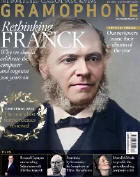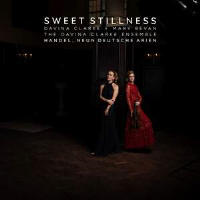Texte paru dans: / Appeared in: |
|
|
Outil de traduction |
|
|
The Nine German Arias occupy a special niche in Handel’s wide and wondrous output.
With texts by Barthold Heinrich Brockes (he of the Passion), they are among the very few examples of the composer working in his native tongue, yet were composed in the mid-1720s, well after he had established himself in London. The words are kindly Enlightenment observations on God’s grace as revealed in nature, and the music – for soprano, continuo and an unspecified treble instrument – is warmly reflective and free from the vocal excesses of the opera house. Were they an artistic refuge from the charivari of his professional environment, a nostalgic reminiscence of calmer student days in Halle (where he and Brockes had been contemporaries)? Whatever, it’s easy to feel a quietly personal element in them.
The arias have been vehicles for some distinguished baroque sopranos but this one emerges from violinist Davina Clarke’s love for playing obbligato to a singer. Accordingly, she is well presented in the balance alongside Mary Bevan, as indeed are the keyboards, cello and theorbo. The resulting detail is welcome, though the larger church acoustic of the Voces8 Centre lurks in the shadows, occasionally to be bothersomely set off by Bevan’s higher notes. Not that there’s anything wrong with singing itself, which is reliably smooth, rich and secure while working within the ensemble to bring individual character to each aria. Thus, for instance, ‘Die ihr aus dunklen Grüften’ mines its affect from perky short notes and gruff cello spread-chords, ‘Das zitternde Glänzen’ flows like a stream and ‘Meine Seele hört im Sehen’ is a joyful prance. Clarke’s delicate and sensitive partnering – nowhere better shown than in the moving title-track ‘Süsse Stille, sanfte Quelle’ – contrasts with her more carefree and assertive way with two Handel sonatas, vividly supported by the continuo section.
The competition is strong. The best includes two from Emma Kirkby and London Baroque, the first (Erato, 2/86) an exquisite gem, the second (BIS, 5/10) a remake which is warmer and wiser if perhaps a touch less comfortable. Both use violin obbligato throughout, as does Carolyn Sampson’s enchanting account with The King’s Consort (Hyperion, 7/07), while the alert readings of Dorothea Röschmann with the AAM Berlin (Harmonia Mundi, 4/00) and ravishingly sung performances by Nuria Rial with the Austrian Baroque Company (DHM, 5/10) both mix up the obbligato instruments for colour. The new recording may not quite match these particular beauties but the atmosphere it conjures of affection and conviviality is just as it should be. Lindsay Kemp
|
|




